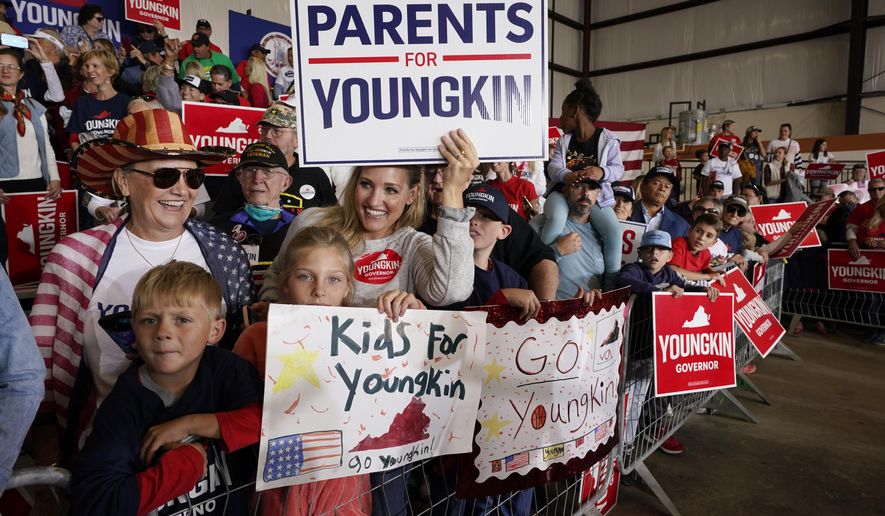Democratic Party officials insist they’re ready for the debate over education after parental anger at public schools helped Republicans score a string of upset victories in the Virginia elections this month.
Democrats say what happened in Virginia was a fluke and they will fight in the 2022 midterm elections for the parent vote, a bloc Republicans believe has shifted to the GOP side.
“Bring it,” said Chris Taylor, spokesman for the Democratic Congressional Campaign Committee, the campaign arm for House Democrats.
He said Democrats have plenty to say to education-minded voters, including being the party that “safely reopened schools” and provided stimulus checks to most Americans.
Democrats are looking to expand that even further, he said, seeking to fund universal preschool and some sort of federal paid family leave program as part of President Biden’s $1.75 trillion budget plan.
“Republicans oppose all of it,” he said. “When they try to score political points by making our classrooms a political battlefield, our young people are the ones who lose.”
Still, Democratic officials across the country are reinforcing their education platforms ahead of the midterm elections that currently favor Republicans taking the House majority.
Bryce Smith, chair of the Democratic Party in Dallas County, Iowa, said the key is to define their education platform before Republicans do it for them.
“It is so easy for Democrats to say we are the party of public education because we have always supported public education,” Mr. Smith said. “That is not good enough for some voters. That says you are supporting the status quo, and if we learned anything about the last six years is that they don’t want the status quo.”
“It is not what sells,” he said. “So the key is how do we create a message that says we are the party of public education, while also striking a nerve with voters?”
In some regions, Democrats are digging in on the side of school boards, the opposite strategy of Republicans who side with parents when there is a conflict between the two.
Matt Mareno, chair of the Waukesha County Democratic Party in Wisconsin, pointed to Democrats’ success in beating back recall efforts in local school board races amid fights over what’s being taught in the classroom.
He said Democrats have staked out the “pro-student in the classroom” position “while the Republicans are focusing on banning books, banning the pride flag and holding recall elections.”
“We have already firmly established ourselves as the party that is reasonable and supports school boards,” he said.
Politico pros from both parties have been studying the Virginia election for signs of where the education debate is going.
Republicans say parents have grown fed up with Democrats’ caving to teachers unions, beginning with school closures during the coronavirus pandemic and now extending to debates over teaching critical race theory, which makes racism and the impacts of slavery the focus of U.S. history and civics classes.
Virginia Gov.-elect Glenn Youngkin tapped into seething anger over COVID-19-related school shutdowns and complaints about critical race theory in the curriculum, turning out education voters who helped him lead a GOP sweep of the state’s top offices.
Meanwhile, clashes between parents and school boards are boiling over from coast to coast.
“Democrats’ decision to label concerned parents as domestic terrorists was flat out wrong,” said Michael McAdams, spokesman for the National Republican Congressional Committee, the campaign arm for House Republicans. “Republicans have a major opportunity to make gains with education voters because we believe parents should have a say in their child’s education.”
Terry McAuliffe, the Democrat who lost to Mr. Youngkin and who previously served as governor from 2014 to 2018, didn’t help matters when in a debate he defended vetoing a bill that would have given parents a chance to object to books in their children’s school curriculums.
“I don’t think parents should be telling schools what they should teach,” Mr. McAuliffe said.
But in a post-election memo, the McAuliffe campaign insisted that comment wasn’t a big factor. Education never ranked high as an issue for voters, the campaign said.
Still, the memo delivered some more worrying news to Democrats. It said voters actually gave the GOP the advantage on education throughout the campaign. The campaign blamed COVID-19 school closures for creating that situation.
Education ranked third among Virginia voters with 14% saying it was their top issue, behind the economy at 34% and COVID-19 at 17%, according to an AP VoteCast survey of voters.
Republicans say the education issue was key to Mr. Youngkin’s win.
“He found an issue that resonated not only with his base, but with swing voters in the middle that ultimately decided the election, and in this case it was education,” said J. Tucker Martin, a Virginia-based GOP strategist. “They wisely picked up on the general sense of unease and displeasure with how education was going right now and they ran with it.”
Some Democratic officials write off the Virginia results as an aberration.
Brenda Lopez Romero, chair of the Democratic Party in Gwinnett County, Georgia, said the wins by Mr. Youngkin and other Republicans were based on “misinformation and scare tactics” about what’s being taught in schools.
“It is not a surprise, it is not a wake-up call, but it does make sure we provide a message that is about solutions and evidence-based, fact-based information,” she said. “That is how you combat this.”
• Seth McLaughlin can be reached at smclaughlin@washingtontimes.com.




Please read our comment policy before commenting.